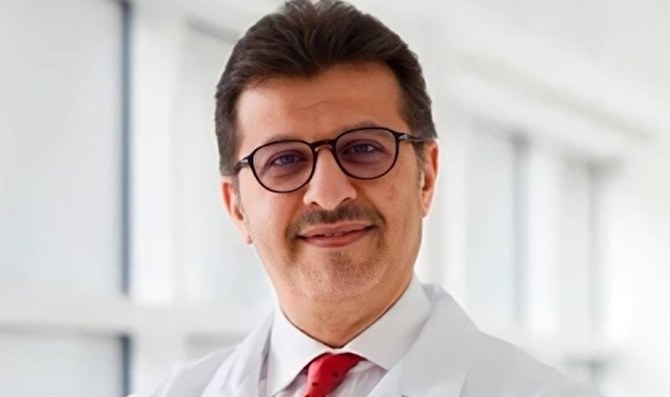MAKKAH: Saudi surgeon Dr. Hani Najm has been named the first winner of the Great Arab Minds award in medicine, which was launched by Sheikh Mohammed bin Rashid Al-Maktoum, vice president and prime minister of the UAE, and ruler of Dubai, in January 2023.
The award, which celebrates the most brilliant minds in the Arab world and their positive impacts on society, acknowledges accomplishments across six categories: engineering and technology, medicine, economics, architecture and design, natural sciences, and literature and arts.
It was presented to the Saudi surgeon in recognition of his outstanding contributions to pediatric and adult cardiac surgery, as well as his innovations in surgery to treat congenital heart diseases.
The doctor is credited with the design and development of a flexible, growth-compatible heart valve to be used inside a child’s body. It can be implanted in the heart and adjusts according to a child’s growth over the years, sparing infants and children the risks of multiple surgical procedures.
As the first Arab to serve as Chair of Pediatric and Congenital Heart Surgery at Cleveland Clinic, Dr. Hani Najm has a distinguished career, notably developing a heart valve that grows within a child's body. @Dr_HaniNajm @ClevelandClinic#GAM #GreatArabMindsAward #GAMAward pic.twitter.com/qUu9JhgBQz
— نوابغ العرب (@greatarabminds) November 29, 2023
Najm participated in over 10,000 surgical operations in newborns, children, and adults with heart diseases, managing complex and critical cases.
Born in Riyadh, Najm graduated from the College of Medicine, King Saud University in 1985. He was trained in general surgery, cardiothoracic surgery, and pediatric congenital heart surgery in Canada.
For 17 years, he headed the Children’s Heart Center at the King Abdulaziz Medical City in Riyadh and was a pioneer in performing critical heart surgeries for patients in the Kingdom, sparing them the need to travel abroad for treatment. He was also one of the first surgeons to perform an artificial heart transplant in Saudi Arabia.
He headed the Saudi Heart Association, served as editor in chief of the Journal of Saudi Heart Association, and was an associate professor at King Abdulaziz University for Health Sciences, Riyadh. He is also an international lecturer in the field of congenital heart surgery.
He joined Cleveland Clinic in 2016 as the chair of pediatric and congenital heart surgery and is currently a member of many national and international professional organizations, including the Gulf Heart Association, the Board of Trustees of the American College of Cardiology, and the European Society of Cardiothoracic Surgery.
Speaking to Arab News, Najm said: “This award is the culmination of a long journey and diligent work in the field of heart surgery. I did not expect this much success in the beginning.
“This award will reflect greatly on my work and on the work of eminent Arab scholars, who in turn will aspire and work hard to obtain the award … a source of pride for all Arabs.
“When I came to the US, one of my most important goals was to be an ambassador for my country. I was striving to gain the trust of the team, the hospital, and the community. Everyone knew that I was coming from a different society, so I worked hard to prove myself and (show) that my recruitment was the right move,” he said.
Najm dedicated this award to his homeland, which he said opened the doors for him to the best centers in the world for training.
He underlined that the excellence he has achieved is the result of the great education he received in Saudi Arabia.
He also thanked his wife and children for supporting him during this journey and the many long hours he spent in the hospital for surgeries.
In a message to Saudi doctors, Najm said: “You have a high level of professionalism, just like all the doctors in the world. The root of my distinction is the education I got from King Saud University, on which I built my scientific and practical experiences. You are the seeds of success, and you can get global recognition, especially in light of the great support provided by our country.”














